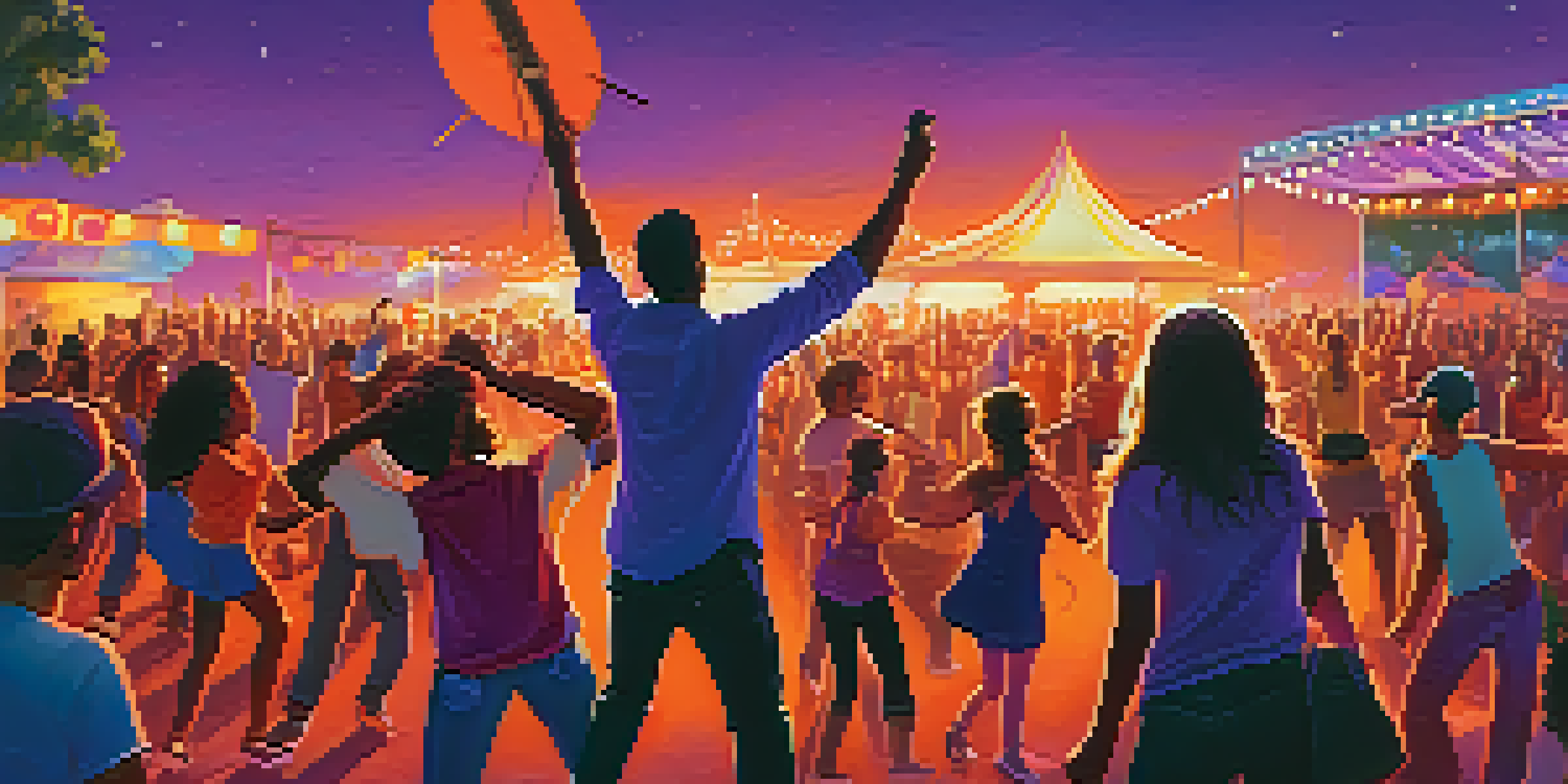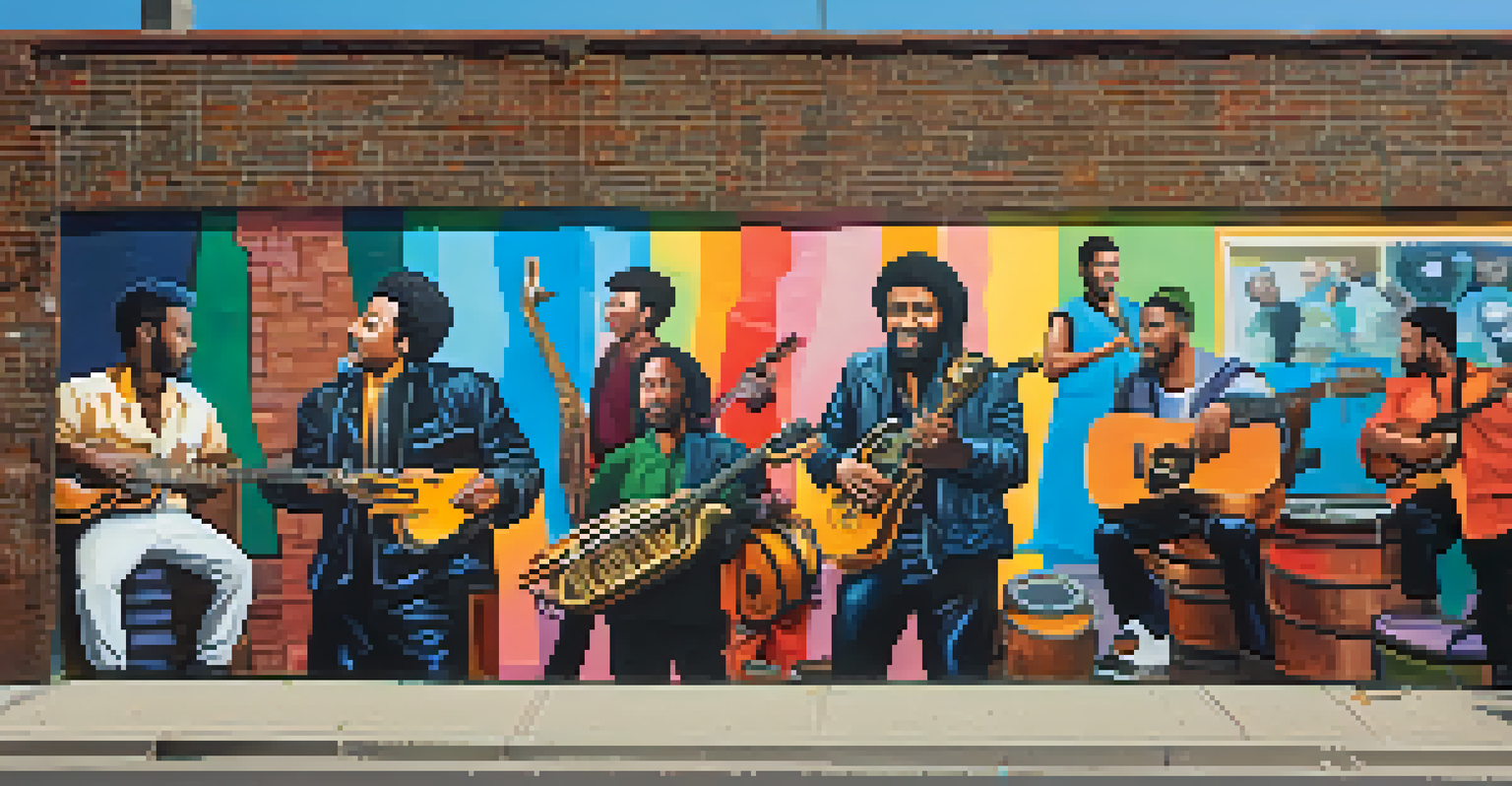Voices of Change: Music in Social Justice Movements

The Power of Music in Social Movements
Music has always been a powerful force for change, acting as a unifying anthem for movements. From protest songs to rallying cries, melodies can inspire action and solidarity among diverse groups. Think about how the civil rights movement used songs like 'We Shall Overcome' to evoke hope and resilience during challenging times.
Music can change the world because it can change people.
These songs often encapsulate the struggles and aspirations of a community, making complex issues feel more relatable. They can break down barriers, allowing people to connect emotionally with causes they might not otherwise engage with. When a catchy tune is paired with a message of justice, it becomes hard to ignore.
Moreover, music has the unique ability to transcend language and cultural differences, making it a universal tool for advocacy. This is why musicians and activists alike recognize the importance of harnessing music to amplify their voices and messages in the fight for social change.
Historical Examples of Music in Justice Movements
Throughout history, music has been woven into the fabric of social justice movements. For instance, during the anti-apartheid struggle in South Africa, songs like 'Nkosi Sikelel' iAfrika became symbols of resistance and hope. These songs not only rallied supporters but also caught the attention of the international community.

Similarly, the labor movement in the United States thrived on music, with artists like Woody Guthrie creating songs that highlighted workers’ rights. His song 'This Land Is Your Land' serves as a reminder of the collective struggle for equality and justice across the nation.
Music Unites for Social Change
Music acts as a powerful tool for social movements, inspiring action and solidarity through relatable anthems.
These historical examples show that music is not just entertainment; it's a powerful tool for social change. It has the ability to create a sense of belonging, inspire action, and push for a collective vision of a better future.
Contemporary Artists Leading the Charge
Today, many contemporary artists continue the tradition of using music as a platform for social justice. Musicians like Kendrick Lamar and Beyoncé have infused their work with themes of racial equality and empowerment. For instance, Lamar’s 'Alright' became an anthem for the Black Lives Matter movement, resonating deeply with those advocating for change.
The power of music makes all the difference in the world.
In addition to hip-hop and pop, genres like folk and punk have also played significant roles. Bands such as Rise Against and artists like Hozier use their platforms to raise awareness about issues like climate change, LGBTQ+ rights, and mental health. Their music sparks conversations that extend beyond the musical realm.
These artists remind us that music can serve as both a form of protest and a call to action. By combining catchy melodies with powerful messages, they engage listeners and encourage them to think critically about social justice issues.
The Role of Music Festivals in Activism
Music festivals have increasingly become hubs for social activism, providing a space for artists and audiences to come together for a cause. Events like Coachella and Glastonbury not only entertain but also educate attendees about pressing social issues. Activist booths and panel discussions often accompany performances, creating a multi-layered experience.
These festivals also amplify the voices of underrepresented artists and causes, giving them a platform to reach larger audiences. For example, the annual Bonnaroo Music and Arts Festival has featured initiatives supporting environmental awareness and social justice. Attendees leave not just inspired by the music, but equipped with knowledge to make a difference.
Historical Impact of Protest Songs
Throughout history, songs like 'We Shall Overcome' and 'Nkosi Sikelel' iAfrika have symbolized resistance and rallied communities for justice.
This intersection of music and activism at festivals shows that entertainment can be a powerful vehicle for advocacy. It encourages a sense of community, urging participants to unite for the greater good while enjoying their favorite acts.
How Music Inspires Youth Activism
Music has a unique ability to resonate with younger generations, making it a catalyst for youth activism. Many young people feel inspired by songs that speak to their experiences and aspirations, often using these anthems to fuel their passion for social justice. For instance, Billie Eilish’s music often addresses mental health and climate change, engaging her fanbase in meaningful conversations.
Social media also plays a crucial role in this dynamic, allowing young activists to share their favorite songs and messages quickly. Platforms like TikTok have made it easy for songs tied to social movements to go viral, further amplifying their reach. This creates a ripple effect, encouraging more young people to join movements.
By tapping into the emotional and motivational power of music, youth are empowered to take action. Whether it’s participating in protests, raising awareness, or advocating for change online, music fuels their drive to create a better world.
The Impact of Streaming on Activism
The rise of streaming services has transformed how music is consumed and shared, making it easier than ever for activist songs to reach global audiences. Platforms like Spotify and Apple Music allow listeners to discover and support music that resonates with social justice causes. This democratization of music enables lesser-known artists to gain exposure and influence.
Additionally, curated playlists dedicated to activism can help listeners find songs that align with their values. For example, playlists focusing on movements such as Black Lives Matter or climate justice can propel certain tracks into the mainstream, amplifying their messages and reach. The convenience of streaming can turn casual listeners into informed advocates.
Youth Empowered by Activist Music
Contemporary artists engage younger generations in activism by addressing social issues through relatable music and social media platforms.
However, this shift also raises questions about commercialization and authenticity. While streaming can promote activism, it’s vital for artists to remain genuine in their messaging. The challenge lies in balancing commercial success with the integrity of their cause.
The Future of Music and Social Justice
Looking ahead, the relationship between music and social justice is likely to evolve as new challenges emerge. As societal issues become more complex, musicians must adapt their messages to inspire and mobilize audiences effectively. This could involve exploring innovative genres, collaborating across boundaries, and using technology to enhance engagement.
Moreover, as more artists take a stand on social issues, the expectation for them to be advocates may grow. Fans are increasingly looking for authenticity and accountability in the music they support. This trend could lead to a new wave of artist activism, where musicians use their platforms to promote change consistently.

Ultimately, music will remain a vital part of the social justice landscape. Whether through traditional performances, online campaigns, or grassroots initiatives, its power to unite and inspire will continue to shape the future of advocacy.